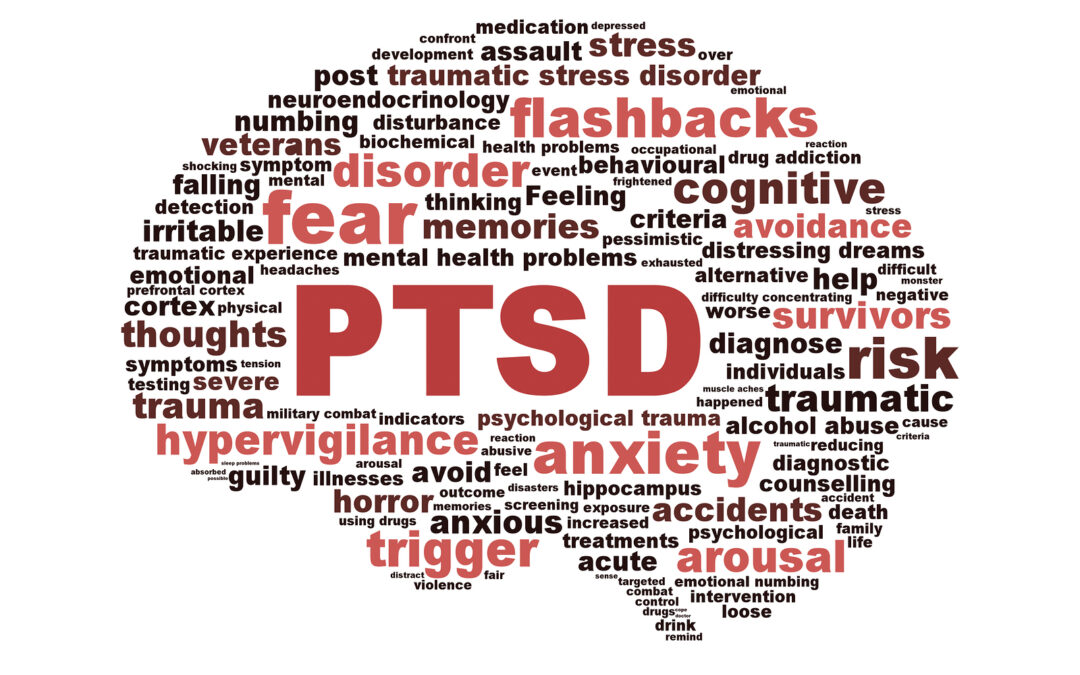Post-traumatic stress disorder (PTSD) can develop after a very stressful, frightening or distressing event, or after a prolonged traumatic experience. Any event that is considered life threatening to the nervous system can cause PTSD. This can include, serious accidents, war and combat, child abuse and neglect, rape and sexual assault, being mugged or accosted, physically abusive relationships or even watching someone else in a dangerous situation. It can be one traumatic event or a series of them that leads to PTSD symptoms.
Basically, what the brain is doing when it is experiencing PTSD it is linking a past feeling of not being safe with a current stimulus or experience that reminds the brain of the event or events of the past. For instance, a person who was abused by an angry yelling parent might start to physically shake as an adult when someone raises their voice. The tone of voice is the brain’s trigger to begin to be afraid. Or someone that was assaulted might avoid going into the same neighborhood where the assault took place and even worse, if the fear generalizes they might begin to be afraid of leaving their home all together. The brain is linking things together that might not be related in order to protect that person from further harm.
Back in 2008, when I lived in the Mission district of San Francisco, I rented a room from a much older man. He was in his 70’s and a sort of beat nick type. He was a soft-spoken character that I rarely saw because he worked as a 3rd shift cab driver all night and slept all day.
Every Fall, San Francisco would have a week-long festival called Fleet Week, in celebration of the US Navy. Part of the celebration included fly overs by the Blue Angel pilots. The planes would fly close to buildings and create roaring echoes through downtown and the nearby neighborhoods.
To me it was un-nerving. But unfortunately for my roommate it was devastating. One afternoon I came home to find him sitting on the floor in the corner of the living room with his arms over his head as the Blue Angels spun around over our house. He was so embarrassed that I saw him in that state, and said, ” I know that it is just friendly plane fun, but my body doesn’t know that.” That summed up PTSD so perfectly. You see, he had fought in the Vietnam war. He had eluded to me earlier that he “saw some things” in the war but he would never talk about them. The sound of the fighter planes triggered whatever trauma he had been through in that war and his body responded as if he was in danger like he must have been back then. His brain was taking a past reference and generalizing it to link to a present external trigger, the sound of the plane meant danger and his body was reacting as if he were going to be killed. He couldn’t talk himself out of it because the part of his brain that was doing that was the same part that is in charge of breathing and his heat beating; the survival system.
NLP (Neuro Linguistic programming) has been proven to be a cure for the symptoms of these traumatic past events. Using some of the powerful techniques that NLP offers, people have had their symptoms of PTSD disappear altogether. They still might remember the traumatic event but their physiology no longer reacts as if it is life threatening.
NLP aims to unwire the traumatic event(s) in the brain so that they are no longer compelling or used as a reference experience for the present. Simply put, NLP scrambles and revises the images, smells, sounds and emotions of the past event, so that they are no longer emotionally triggering. Another big component is working with the part of the neurology that is storing these memories of danger and letting the system know that they made it. They survived. Often fear responses of fight, flight and mostly freeze will cause the traumatic event to get frozen in time and the brain never finishes the story. It doesn’t realize that the event is over, it is in the past and that the person survived it. When this information gets included in the memory the safety systems of the brain are more apt to let it go and let past complete so that the person’s present-day experiences are about the present and not referenced by the past.
In the case of childhood trauma, often a child is much more vulnerable than an adult would be. So, these memories of being powerless and in danger as a kid need to be updated because as an adult we tend to be much stronger, have more control and can say no or fight back. Re-writing the childhood memories and letting the brain know that someone has grown up and is much stronger and capable as an adult is also a way to unwire the trauma.
If you would like help resolving your PTSD symptoms please feel free to contact me for a consultation to learn more.
